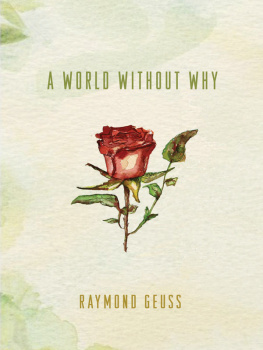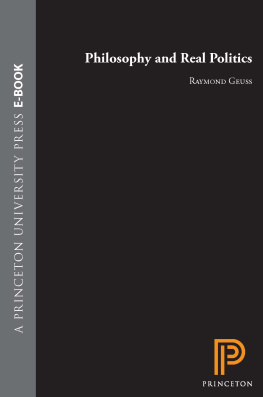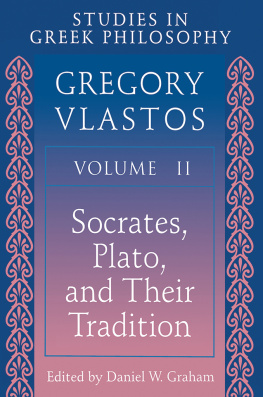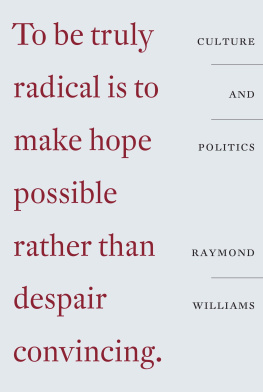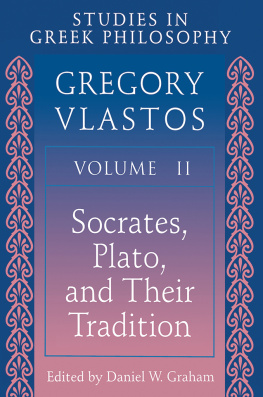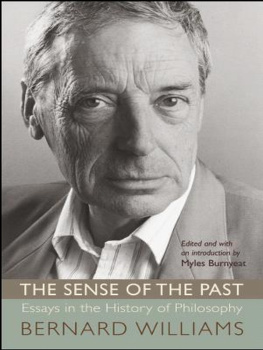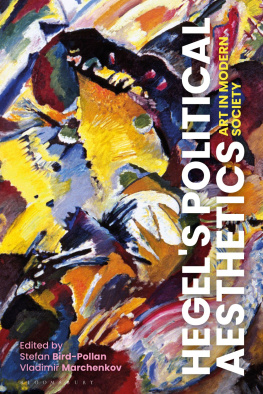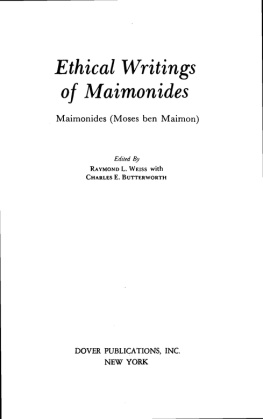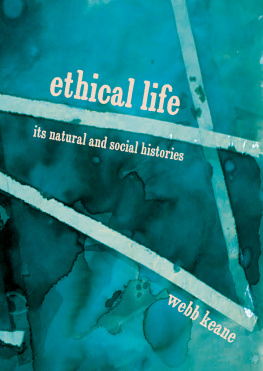
A WORLD WITHOUT WHY
A WORLD WITHOUT WHY

Raymond Geuss

Copyright 2014 by Princeton University Press
Published by Princeton University Press, 41 William Street,
Princeton, New Jersey 08540
In the United Kingdom: Princeton University Press,
6 Oxford Street, Woodstock, Oxfordshire OX20 1TW
press.princeton.edu
All Rights Reserved
Library of Congress Cataloging-in-Publication Data
Geuss, Raymond.
[Essays. Selections.]
A world without why / Raymond Geuss.
pages cm
Includes bibliographical references and index.
ISBN 978-0-691-15588-3 (hardcover)
1. PhilosophyHistory. 2. Philosophy, Modern21st century.
3. Optimism. 4. Ethics. I. Title.
B1626.G481 2014
190dc23
2013043562
British Library Cataloging-in-Publication Data is available
This book has been composed in Garamond Premier Pro
Printed on acid-free paper.
Printed in the United States of America
1 3 5 7 9 10 8 6 4 2
S PIEGEL : Vor zwei Wochen, Herr Professor, schien die Welt noch in Ordnung.
A DORNO: Mir nicht.
Contents

Preface

I t is natural for us to think that humans as animals belong to a certain biological species and are, as such, subject to a number of natural necessities such as the vital need to maintain a certain minimal body temperature and to eat and drink if they are to survive. We are, however, not merely biological entities but also inherently social animals, and societies, too, will need to satisfy certain conditions if they are to survive. In societies that do survive there will be a variety of mechanisms for imposing necessities on individuals and smaller groups; often these mechanisms will function under the guise of simply transmitting or passing on natural necessities. Thus, I must eat if I am to survive, so we must all work cooperatively for several hours a days in the fields or rice paddies if we are to survive. This transmission, however, is never a mere process of neutral passing on necessity. Actual human needs of any kind are never presented to us, as it were, raw but always in one social configuration or other, so any discussion of basic biological needs is perforce a kind of retrospective abstraction, which might be warranted, but, if it is, is always warranted for some specific purpose. In fact, what is called transmission is always a process of the transformation or social constitution of needs. Transformation or constitution is not a mistaken or incautious formulation, as if I couldnt make up my mind whether there was something, some need, there to start with that was transformed into a slightly different need or whether needs did not really exist until social processed. Rather it is an expression of my viewwhich, of course, could be incorrect but is not inconsideredthat this alternative is not to be taken as an absolute but is context-dependent. We all need to work together cooperatively in order to survive is deeply ambiguous, and this ambiguity is a breeding ground for ideological distortion. It can mean:
a. if we dont all work together cooperatively, each of us will die very soon (because the small boat were in is leaking badly)
b. if we dont all work together cooperatively, not all of us will survive (although some may)
c. if we dont all work together cooperatively, we wont survive as a recognizable group (although each individual may disperse and survive alone or as a member of a different group)
In addition to these strict needs, that is, conditions that must be fulfilled if survival is to be ensured, humans also have an individually and socially idiosyncratic set of desires, preferences, wishes, and aspirations. We all need to eat and drink, but I prefer tea to coffee, although many people have the reverse preference. I also recognise that there are, or at any rate have been, individuals and even whole societies, such as that of ancient Rome, in which neither tea nor coffee is drunk at all. We also all grow up and remain throughout our entire lives enmeshed in a thick web of what are now called normative demands that have their origin ultimately in institutions that claim authority over us. In many Western European societies fathers of families were for a long time construed as heads of the household and had significant real and moral powers over their wives, children, and servants; political authorities of various kinds demanded allegiance; churches (or The Church) claimed to preach the word of god and had institutions like courts to enforce their views; relations of economic dependence among the members of small groups gave the words of those in key positions special weight; local forms of social pressure (and of solidarity) could take sharply articulated forms. Finally, as social beings we humans are to some extent capable of perceiving and acquiring knowledge about the real world in which we live, and we have some extremely feeble, only intermittently effective, and highly variable ratiocinative capacities.extent constituted by an attempt to reconcile needs, desires, and normative claims on an individual and social level in view of our best knowledge about our world.
Questions about how individuals and groups should behave can arise in any social form, but it can seem to us from the vantage point of the apparently infinite distance that separates twenty-first-century Europeans from traditional societies that in those societies individuals may be perplexed and different groups (and duties to different groups) may conflict, but the question of the general structure of an individual human life and of social life as a whole will not seem to be particularly problematic. Since, however, the sources of such normative claims will be diverse, it can easily happen that they seem to make different demands on agents even in traditional societies. Equally individuals perceptions, beliefs, and preferences will be different.
It is natural for thinking people in the West to start by assuming that the world is (finally) in order and trying to formulate explicitly and then reconcile the various claims made by the different authorities: The Gospel accounts of Mark and John can be made to tally. The emperor, the pope, and the local lord really are demanding us to lead the same kind of life. St. Paul can be rendered consistent with Aristotle. In a world with relatively intact and generally recognised authorities, the question of discipline, both of how and to what extent one should or may coerce others, and of self-discipline seems in principle answerable: One disciplines people by training them, as much as possible, to want to do what they in any case must (of natural necessity) do and also what they should do. To what extent it will be possible to make people want to do what they must and should do will depend on a number of unpredictable factors, among them the nature of the demands society makes and the kind of forces of coercion, manipulation, and educations it has available to it.
What happens, however, if the questions go beyond queries about reconciling occasional discrepancies between individual authoritative statements? What if the emperor is a sinner and schismatic? What if the pope is a heretic? What if the very idea of being a heretic comes to look archaic and irrelevant? What could proper discipline (including self-discipline) look like in a world like that?
Next page
